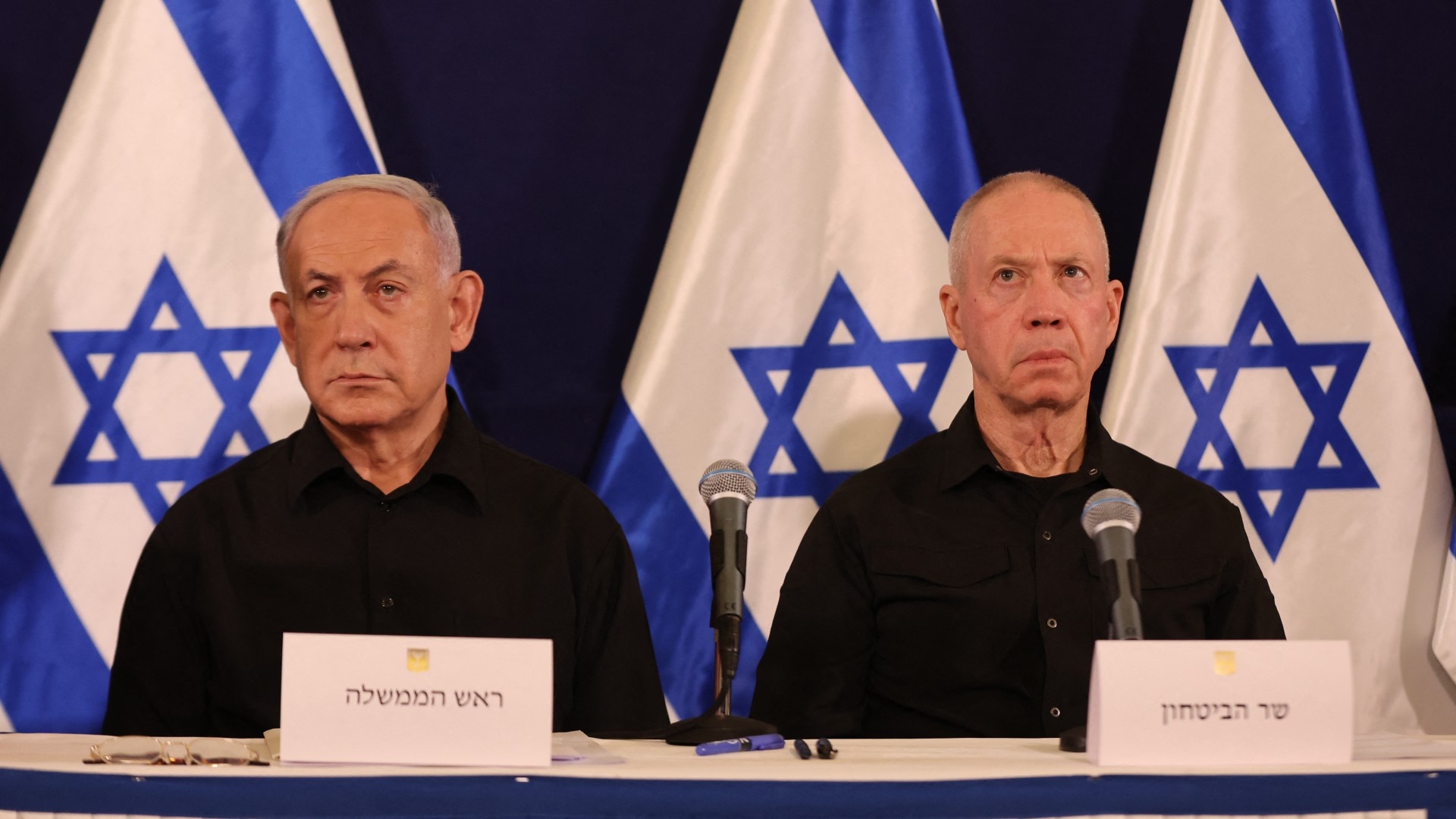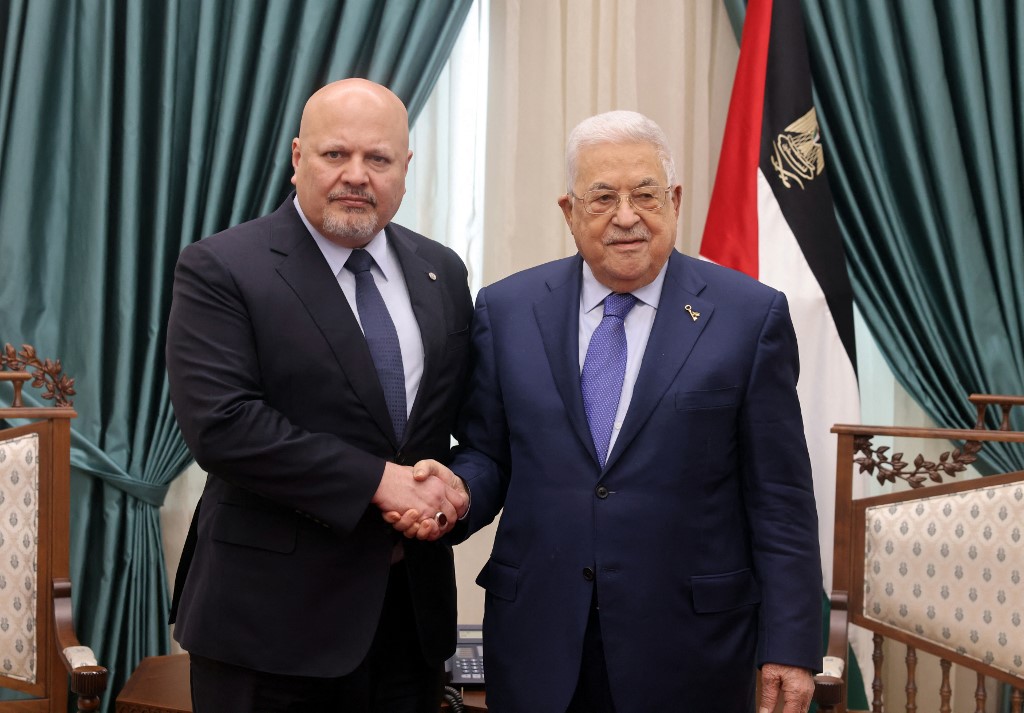War on Gaza: How ICC arrest warrants would impact Israel and its allies
If charges are pressed against Israeli leaders, it would restrict their travel and put western backers in a 'precarious position'

Israeli officials are growing increasingly concerned that the International Criminal Court (ICC) is preparing to issue arrest warrants for its leaders over crimes committed during the ongoing war on Gaza.
Though the charges have not been confirmed by the ICC, Israeli government ministers have spoken publicly in recent days about the rumoured threat.
Prime Minister Benjamin Netanyahu made a video statement earlier this week condemning potential ICC action as "outrageous", and said it would not deter Israel in its military actions in the Gaza Strip.
Netanyahu, Defence Minister Yoav Gallant and Israeli military chief of staff Herzi Halevi are believed to be the most likely to be charged, according to multiple media reports.
On Wednesday, Axios reported that Israel warned Washington that it would take steps which would lead to the collapse of the Palestinian Authority if the ICC charged Israeli leaders.
In addition, Netanyahu has reportedly asked the families of captives held by Hamas in Gaza to try to persuade the ICC not to issue the warrants.
The ICC was formed in 2002 to prosecute individuals accused of war crimes, crimes against humanity and genocide. The crimes later included the crime of aggression.
There are 124 member states who are party to the Rome Statute, the treaty which established the court.
Under the principle of complementarity, the ICC acts as a court of last resort when member states are unwilling or unable to try heinous crimes themselves. It can prosecute nationals of member states, as well as individuals who commit crimes on the territory of member states. It also has jurisdiction over cases referred to it by a UN Security Council resolution.
'Member states have a legal obligation to cooperate fully with the court, which includes arresting those subject to an arrest warrant'
- Eitan Diamond, legal expert
Israel is not a member of the ICC. However, as the state of Palestine was granted membership in 2015, the court can investigate Israeli individuals for crimes committed in the occupied Palestinian territories, which include Gaza, the West Bank and East Jerusalem.
In 2021, the ICC opened an official investigation into allegations of war crimes and crimes against humanity committed in occupied Palestine since June 2014.
Chief prosecutor Karim Khan said in October last year that the court also had jurisdiction over crimes committed by Hamas in Israel and by Israelis in Gaza during the current war.
It is not yet clear exactly what the court is looking at in relation to Israeli officials. International law experts told Middle East Eye it could be: allegations of deliberate starvation; impeding the entry of humanitarian aid into the enclave; direct attacks targeting non-military objects such as hospitals, as well as inhumane treatment of Palestinian detainees.
Travel restrictions
While the likelihood of Israeli leaders standing trial in The Hague is low, arrest warrants will still have a tangible impact beyond symbolism and reputational damage.
If Israeli officials are charged, they would have to restrict their travel in and out of the 124 member states of the ICC.
"Member states have a legal obligation to cooperate fully with the court, which includes arresting those subject to an arrest warrant," Eitan Diamond, of the Diakonia International Humanitarian Law Centre in Jerusalem, told MEE.
'Biden is now understanding that this double standard has a price, and it might cost him his next election'
– Neve Gordon, law professor
“Israel and the Israeli officials concerned would not want to take the risk that states would discharge their obligation.”
It’s a reality that Russian President Vladimir Putin has had to face up to since he, along with another senior official, were indicted by the ICC in March last year over Moscow’s war on Ukraine.
In December, Brazilian President Luiz Inácio Lula da Silva suggested that the Russian leader could be arrested if he attended the G20 summit in Rio later this year.
“Putin has had to be wary as to which states he travels to,” Christian Henderson, professor of international law at the University of Sussex, told MEE. “The same would apply to Netanyahu and Gallant should warrants be issued.”
The ICC has no military force to compel arrests, and is reliant on member states to fulfil their legal obligations as signatories to the Rome statute.
Member states have in the past flouted that obligation: both South Africa and Jordan failed to arrest indicted former Sudanese President Omar Hassan al-Bashir during visits to their respective countries, drawing the ire of human rights groups and the ICC itself.
But should such an eventuality occur now, said Diamond, it would leave Israel - and ICC member states deciding whether to admit indicted Israeli officials into their territories - in a precarious position.
“They would likely wish to avoid a choice between compliance with the arrest warrant or failure to comply - each of which would implicate them in a politically costly, and embarrassing, scandal,” he said.
Neve Gordon, professor of international law and human rights at Queen Mary University of London, said the issue would put ICC member states' commitment to international human rights law to the test.
“If, for example, Netanyahu is named on the arrest warrant and he can continue travelling freely and there's no problem, that jeopardises the legitimacy of the ICC itself,” he told MEE.
In the event of Israeli arrest warrants, it is likely that leaders of Hamas will be indicted too, for its role in the 7 October surprise attack on southern Israel which killed 1,200 Israelis, most of whom were civilians.
As a member state, Palestine would thus be legally obliged to arrest anyone singled out by the court.
“Any party to the Rome statute is obliged to hand over [those issued with warrants], and that includes the Palestinian Authority insofar as they are a party,” said Gordon.
Washington's 'double standards' on Russia
As well as Israel, other notable absentees from the 124 member state signatories are the US, Russia and China.
Under the administration of President Donald Trump, the US was actively hostile towards the ICC. It imposed economic and travel sanctions on ICC prosecutors, after the court launched a probe into possible war crimes committed by the US and its allies in Afghanistan.
President Joe Biden’s administration lifted those sanctions in 2021.
When the ICC slapped Putin with an arrest warrant over war crimes committed in Ukraine, Biden said the action was “justified”.
Ukraine is not a member of the ICC, but it has granted the court jurisdiction to investigate crimes committed on its territory since November 2013.
Unlike its position on Russia, the Biden administration reiterated this week that it does not support any ICC investigation into Israeli crimes in Gaza because “we don't believe that they have the jurisdiction”.
Henderson said: “The US has spent the past two decades discrediting the ICC, so for it to begin to assist it in its investigations against Russian individuals raised question marks as to double standards, which will only be confirmed if it tries to hamper its investigations into the conduct of Israeli officials.”
Gordon said that Washington’s stance showed that it “does not abide by the rule of law” unless it aligns with US foreign policy interests.
“Biden is now understanding that this double standard has a price, and it might cost him his next election,” he said.
“Arab citizens and many Jewish and other concerned citizens in the US are telling Biden: we see this double standard, and it's going to cost you.”
'Dramatic political fallout'
As for Israeli allies who are member states, such as the UK and France, the issue of Israeli charges would be a huge test for their commitment to the court.
"There will be dramatic political fallout from such a development, with potentially damaging effects not just for Israel but also for the ICC and for the rule of international law," said Diamond.
He said the US, as well as influential ICC member states allied with Israel, could take action against the court in response.
The ICC itself has been accused of selectivity, since the vast majority of arrest warrants issued so far are for African individuals.
But in more recent years, the court has opened investigations into crimes committed by the US and allies in Afghanistan, Israeli abuses in Palestine, as well as in Russia's war on Ukraine.
Gordon said that the investigation into Israel resulting in arrests would be significant both symbolically and legally.
"Often in these cases, the court of public opinion is much more important than the legal court," he said.
"But the court of public opinion does need the sword that the legal court extends to [Israeli leaders]. Namely, the threat that they will be arrested if they leave Israel."
https://www.middleeasteye.net/news/how-icc-arrest-warrants-would-impact-israel-allies



0 Comments:
Post a Comment
Subscribe to Post Comments [Atom]
<< Home